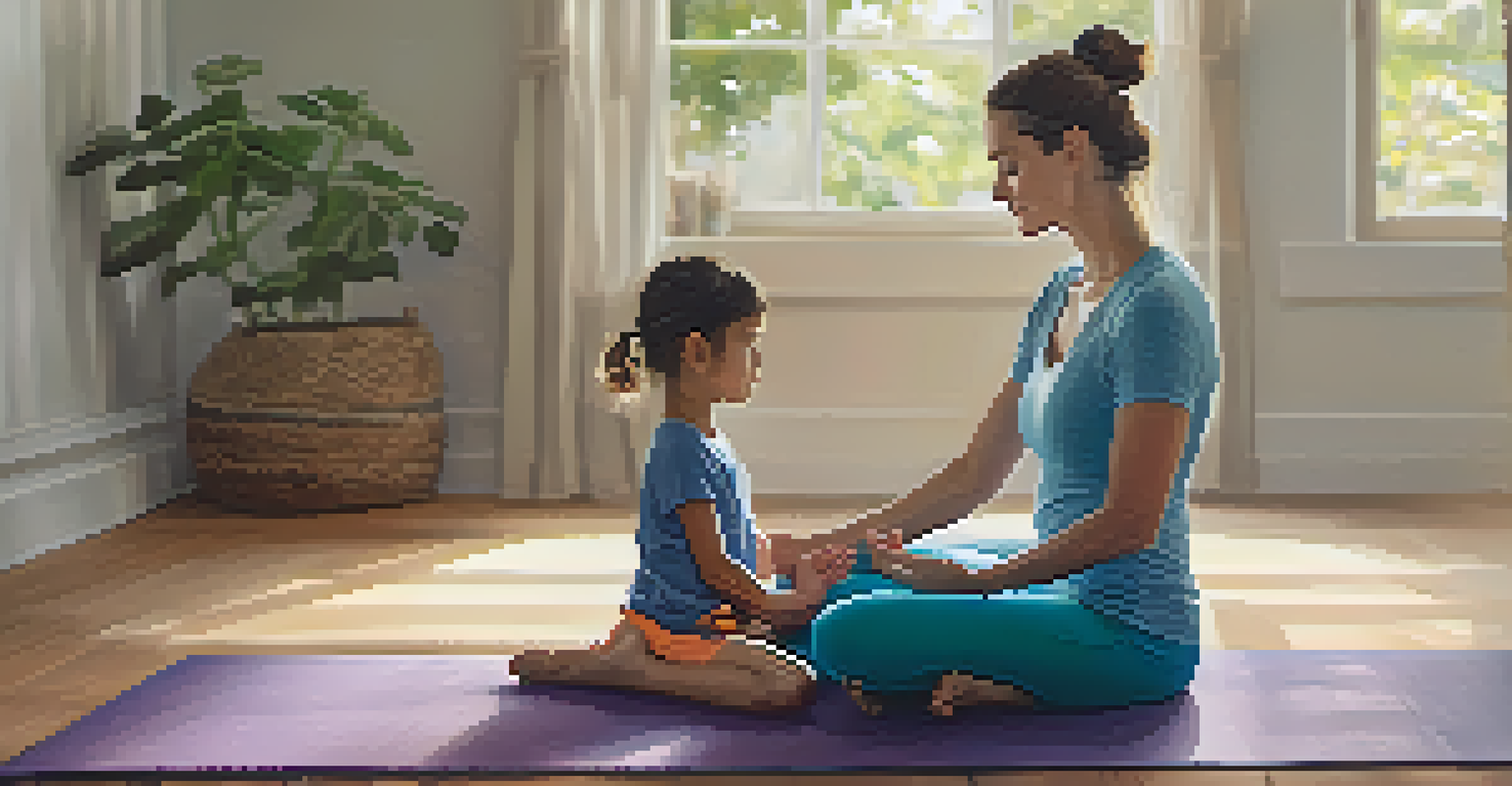Building Resilience: How Yoga Supports Parenting Challenges

Understanding Resilience in Parenting
Resilience is the ability to bounce back from challenges, and in parenting, it’s essential. Every parent faces unique hurdles, from sleepless nights to managing tantrums. Building resilience helps you adapt and cope with these challenges, allowing for a more harmonious family life. Just like a tree sways in the wind but doesn't break, resilient parents can weather the storms of parenting.
The greatest weapon against stress is our ability to choose one thought over another.
Yoga, with its focus on mindfulness and physical well-being, is a powerful tool for cultivating resilience. The practice encourages a deeper connection with oneself, promoting emotional regulation and stress relief. When parents feel balanced and centered, they can handle parenting challenges with greater ease and clarity.
Moreover, resilience isn’t just an individual trait; it can be fostered within the family. When parents model resilience through yoga and mindfulness practices, children learn these essential skills too, creating a supportive environment for everyone.
How Yoga Reduces Stress for Parents
Parenting can often feel like a juggling act, and stress can pile up quickly. Yoga provides a structured way to release tension and reconnect with your body. Through poses and breathing exercises, you can lower cortisol levels, the hormone associated with stress, leading to a calmer state of mind.

For instance, a simple practice like Child’s Pose can offer a moment of respite during a hectic day. This pose not only stretches the back but also provides a sense of comfort and grounding. Taking just a few minutes for yourself can make a significant difference in your overall mood.
Resilience is Key in Parenting
Building resilience helps parents adapt to challenges and fosters a harmonious family life.
Additionally, regular yoga practice encourages mindfulness, which helps parents stay present amidst chaos. By focusing on the breath and body, you can step back from overwhelming emotions and respond to situations with patience and clarity.
Strengthening the Mind-Body Connection
Yoga emphasizes the connection between the mind and body, which is particularly beneficial for parents. When you engage in yoga, you're not just working your muscles; you're also tuning into your emotions and thoughts. This holistic approach helps you recognize stressors and emotional triggers, which is crucial in parenting.
Mindfulness is a way of befriending ourselves and our experience.
For example, when practicing a pose like Warrior II, you cultivate strength and focus, reinforcing the idea that you can stand strong in the face of challenges. This physical empowerment translates into mental resilience, equipping you to handle conflicts and stress with grace.
As you deepen your mind-body connection through yoga, you may find it easier to navigate parenting challenges. It promotes a sense of control and awareness that allows parents to respond thoughtfully rather than react impulsively.
Building a Supportive Community through Yoga
Yoga is often practiced in groups, creating a sense of community among parents. This social aspect can be incredibly beneficial as it allows parents to share experiences and strategies for dealing with challenges. Knowing you’re not alone in your struggles can provide immense comfort.
Joining a local parenting yoga class can foster friendships and create a support network. These connections can lead to shared playdates or simple conversations that lighten the load of parenting. Sometimes, just hearing someone else’s story can make a challenging day feel a little brighter.
Yoga Enhances Stress Management
Practicing yoga provides parents with tools to reduce stress and promotes mindfulness during parenting.
Furthermore, community support encourages accountability. When you commit to a yoga practice with others, you're more likely to stick with it, ensuring that you have a consistent way to manage stress and build resilience.
Incorporating Mindfulness into Daily Parenting
Yoga teaches mindfulness, a practice that can easily be woven into daily parenting routines. Mindfulness involves paying attention to the present moment without judgment, making it easier to respond thoughtfully rather than react emotionally. This can be incredibly helpful during challenging parenting moments.
For instance, when your child is throwing a tantrum, taking a moment to breathe deeply can help you regain composure. Instead of reacting in frustration, you can approach the situation with calmness and understanding. This simple shift can transform how you handle conflicts and cultivate a more peaceful environment.
Incorporating mindfulness can also enhance your interactions with your child. By being present, you can appreciate the little moments, creating stronger bonds and memories that enrich your family life.
Creating a Consistent Yoga Practice at Home
Establishing a yoga routine at home can be an excellent way for parents to foster resilience. It doesn’t have to be a lengthy session; even 10-15 minutes of focused practice can be impactful. Setting aside time for yoga not only helps you unwind but also sets a positive example for your children.
You can involve your children in your practice, turning it into a family activity. Simple poses like Tree Pose or Downward Dog can be fun for kids to imitate, and it teaches them the value of movement and mindfulness. This shared experience can strengthen family bonds while promoting a healthy lifestyle.
Community Supports Parenting Journey
Joining yoga classes creates a supportive network for parents, helping them share experiences and strategies.
Moreover, creating a serene space in your home dedicated to yoga can encourage you to practice regularly. Whether it's a corner with a mat or a room with calming colors, having a designated area can be a powerful reminder to prioritize your well-being.
The Long-Term Benefits of Yoga for Parents
The benefits of yoga extend beyond immediate stress relief; they can have lasting effects on your parenting journey. By cultivating resilience through yoga, parents can experience improved emotional regulation, enhanced patience, and a greater sense of well-being. This translates into a more positive atmosphere at home.
Research shows that parents who engage in regular yoga practice often report increased life satisfaction and reduced feelings of burnout. By taking care of your own physical and emotional health, you're better equipped to nurture and support your children.

Additionally, modeling healthy habits, such as yoga and mindfulness, teaches children valuable skills for managing their own stress and challenges. By raising resilient children, you’re not just improving your parenting experience; you’re also setting them up for success in their own lives.